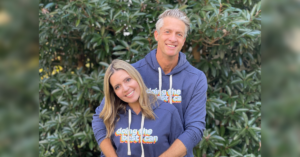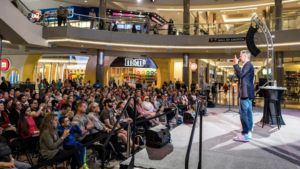When Penn’s parents had to move into a skilled nursing home for Alzheimer’s and dementia, we had the task of cleaning out their house. While I am normally the person who would throw away everything, I found myself getting very sentimental. I wanted to hoard all the things. On the flip side, Penn and his brother were surprisingly less so. When Penn retells this story, he says everyone around him was afraid he was disassociating or not thinking clearly. But the reality was, he understood the stuff we were looking through was just… stuff.
There’s a lot of reasons we hold onto things, but one profound thing about that is: Everything that you own, owns a part of you.
When You Have Too Much Clutter
This week we talk with Kathryn Snearly, of the viral YouTube channel Do It On A Dime. Kathryn introduced me years ago to the idea of Swedish Death Cleaning. (And no, it’s not where you listen to death metal music while you organize.) Kathryn first heard of the idea from a book by Margareta Magnusson. Swedish Death Cleaning seeks to end the generational burden of clutter. If you simplify and clean out your own clutter before you pass, your family will have less to deal with. Kathryn, despite being in her 30s, decided to try this method well before the recommended age by Magnusson. It was life-changing for her.
In our discussion, we also explored the two types of outlooks on clutter. Clutter is a sense of stress and anxiety for me, while Penn doesn’t really even notice it. For him, too much order stifles his creativity. He likes a little mess in his life. If you’re not living in bliss like Penn, don’t feel alone. 50% of people feel overwhelmed by the stuff in their own home, and for good reason: The average home contains 300,000 items in total.
When Loved Ones Have Passed On
If you’re in the stage of life where you are cleaning out items from a loved one who has passed and you feel overwhelmed, I hope you find comfort in this podcast. Kathryn discusses some of her own struggles with letting go of possessions from her loved ones. She finds for herself it’s more meaningful to have less items that she continually uses or sees. At the end of the day, no one can take the memories and feelings you have for someone. Those things don’t live in material possessions, they live inside you.
Take a listen to our discussion, and tell us if you feel inspired. We hope you do.
Acast: https://open.acast.com/
Apple Podcasts: https://podcasts.
Spotify: https://open.spotify.
Pandora: https://pandora.app.




